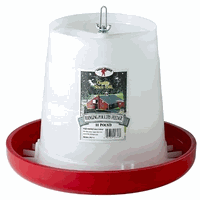I've tried this product several times, and still use it. It is very safe for use on chickens, compared to Sevin or poultry dust. But, I haven't found it to be all that effective at actually treating mite infestations. I would spray birds repeatedly and clean the environment, and the mites just wouldn't go away. It doesn't work nearly as well as Sevin dust or Frontline spray as a mite controller.
Though it hasn't actually treated the birds very well, I do use it as a preventative measure. I spray down roosts and other supplies like cages regularly with it. I can't really tell whether it is really helping or not with this, either.
Another problem I have with it is that it is rather expensive. You use a lot if it when spraying the birds or the coop.
In summary, if you have a mite infestation, this product may not work well for you. If you are just using it as a preventative, it might help, but not neccesarily.
Though it hasn't actually treated the birds very well, I do use it as a preventative measure. I spray down roosts and other supplies like cages regularly with it. I can't really tell whether it is really helping or not with this, either.
Another problem I have with it is that it is rather expensive. You use a lot if it when spraying the birds or the coop.
In summary, if you have a mite infestation, this product may not work well for you. If you are just using it as a preventative, it might help, but not neccesarily.















